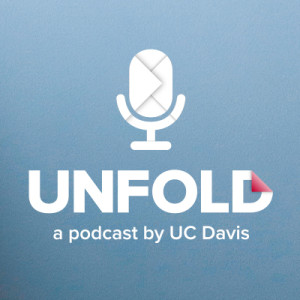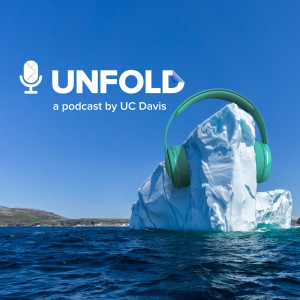
63.2K
Downloads
66
Episodes
Unfold, a UC Davis podcast about science, innovation and discovery, unfolded through storytelling. We make complex topics relatable and reveal answers to questions you’ve always been curious about. Each episode takes you into the field with leading researchers who are working to tackle big picture problems – like how we’re going to feed a growing population, adapt to climate change and improve the health of people, animals and the planet. Hosted by public radio veteran Amy Quinton. Co-hosted by Kat Kerlin and Marianne Russ Sharp. Sponsor free. Learn more at ucdavis.edu/unfold.
Episodes

Tuesday Nov 02, 2021
Chonk the Axolotl: How Life Is Super Amazing
Tuesday Nov 02, 2021
Tuesday Nov 02, 2021
In this episode of Unfold, you’ll hear about Chonk, a pink, baby-faced axolotl who has become a bit of a superstar on Twitter. This fully aquatic salamander is helping developmental biologists understand neural crest cells. These cells help form our face, skin color and peripheral nervous system. Discovering more about these cells can help researchers understand congenital disorders and certain types of cancer.
In this episode:
Crystal Rogers, assistant professor, UC Davis Department of Anatomy, Physiology, and Cell Biology at the School of Veterinary Medicine

Tuesday Oct 26, 2021
Murder, Suicide and the Macabre
Tuesday Oct 26, 2021
Tuesday Oct 26, 2021
We discuss a macabre trend from the 1700s in Germany in this special Halloween episode of Unfold. To avoid eternal damnation for the sin of committing suicide, a number of people began committing child murder so they could be forgiven by a priest before being executed. In this Unfold episode, we look at how imagined child murders can create a culture of actual killings. Warning: this subject matter might not be suitable for all audiences.
In this episode:
Kathy Stuart, associate professor, UC Davis Department of History

Tuesday Oct 19, 2021
*Was* She a Badass?
Tuesday Oct 19, 2021
Tuesday Oct 19, 2021
Nine thousand years ago, a woman was buried in the Andean mountains of Peru next to tools normally associated with big-game hunting. Before you think she was just a badass, UC Davis researchers found that many females in the early Americas were big-game hunters and we shouldn’t be so quick to project our own gender stereotypes and current cultural values on ancient societies. In this episode of Unfold, we dig a little deeper to learn more about this archaeological discovery.
In this episode:
Randy Haas, archaeologist and assistant professor, UC Davis Department of Anthropology
Monique Borgerhoff Mulder, distinguished research professor emeritus, UC Davis Department of Anthropology
Glendon Parker, adjunct associate professor, UC Davis Department of Environmental Toxicology
Kim Senklip Harvey, indigenous theorist and cultural evolutionist with the Tsilhqot’in and Syilx nations

Tuesday Oct 12, 2021
Nature Tells Its Story, Part 2: Caves and Really Old Water
Tuesday Oct 12, 2021
Tuesday Oct 12, 2021
California boasts hundreds of caves, many of them hidden in the Sierra Nevada foothills. These caves hold much more than beautiful icicle-like stalactites and stalagmites. Trapped inside the stalagmites are tiny droplets of fossilized precipitation from climates long ago. In “Nature Tells Its Story Part 2” of Unfold, UC Davis researchers discuss how these water droplets provide a “climate archive” that may help us predict future shifts in rain, snow and drought.
In this episode:
Isabel Montañez, distinguished professor, UC Davis Department of Earth and Planetary Sciences
Barbara Wortham, doctoral student, UC Davis Department of Earth and Planetary Sciences

Tuesday Oct 05, 2021
Nature Tells Its Story, Part 1: Fish Eyes and Ears
Tuesday Oct 05, 2021
Tuesday Oct 05, 2021
A fish can’t talk, but its eyes and ears can. Scientists have discovered that each layer of a fish’s lens reveals a different part of its life history, including what it’s eaten throughout its life. While you’ve probably never heard of fish otoliths, these ear bones tell us not only a fish’s age, but what rivers it has traveled. Understanding this could help wildlife managers know what habitats to protect to help imperiled species. In “Nature Tells Its Story Part 1,” Unfold looks at the eyes and ears of fish.
In this episode:
Miranda Bell Tilcock, assistant specialist researcher, UC Davis Center for Watershed Sciences
Carson Jeffres, senior researcher and fish biologist, UC Davis Center for Watershed Sciences

Tuesday Sep 28, 2021
Why is that Song Stuck in My Head?
Tuesday Sep 28, 2021
Tuesday Sep 28, 2021
Earworm, brainworm, whatever word you choose, it’s that song that gets stuck in your head. Research shows that more than 90% of us experience earworms. UC Davis researchers have found that they may play an important role in helping us form memories, not just for the song, but for life events. In this episode of Unfold, we examine music, memory and what earworms can teach us about how the brain works.
In this episode:
Petr Janata professor, UC Davis Department of Psychology and Center for Mind and Brain
Ben Kubit, postdoctoral researcher, UC Davis Center for Mind and Brain

Monday Sep 13, 2021
Unfold Season 3: Driven By Curiosity
Monday Sep 13, 2021
Monday Sep 13, 2021
Coming Sept. 28, Unfold brings you stories of awe, wonder and discovery as we explore how UC Davis researchers are driven by curiosity. Curiosity can lead to some of the greatest discoveries, like why songs get stuck in your head or what real-world engineering concepts you can learn from comic book superheroes. This season, we examine an archaeological discovery that raises new questions about the sexual division of labor in early hunter-gatherer societies. UC Davis researchers reveal what they found by peeling back the layers of a fish’s eye and by studying cute, pink, baby-faced axolotls. We have lots of surprising and curious stories to tell this season — even a spooky, dark and murderous one, just in time for Halloween.

Monday Nov 30, 2020
E-Commerce and Climate Change
Monday Nov 30, 2020
Monday Nov 30, 2020
Millions of people plan to make online purchases today for deals on Cyber Monday. In this encore episode of Unfold, you'll hear how impulse buying, fast shipping and returns can all lead to a higher carbon footprint. Miguel Jaller with the UC Davis Institute of Transportation Studies will unfold all the complexities of e-commerce.
In this episode:
Miguel Jaller, Co-director of the Sustainable Freight Research Center at the UC Davis Institute of Transportation Studies

Tuesday Nov 17, 2020
How Climate Change is Punishing the World‘s Poor
Tuesday Nov 17, 2020
Tuesday Nov 17, 2020
Unfold travels to Kenya, where climate change is threatening a way of life for pastoralists. Climate change is driving families deeper into poverty. When drought hits, men travel for weeks in search of water and greener pastures for their livestock herds. The women and children are left behind with no stable source of food or income. UC Davis agricultural economists are researching the pairing of two intervention programs, including a type of climate insurance policy, to keep these vulnerable populations from falling so deep into poverty that they have no way to recover.
In this episode:
Michael Carter, professor of agricultural and resource economics, and director of the Feed the Future Innovation Lab for Markets, Risk and Resilience at UC Davis, with research in Kenya funded by USAID.
Tom Lenaruti, Project Coordinator, BOMA Project
Nathan Jenson, economist at the International Livestock Research Institute

Tuesday Nov 10, 2020
Transitioning to Low-Carbon Transportation
Tuesday Nov 10, 2020
Tuesday Nov 10, 2020
In California, 40 percent of greenhouse gas emissions comes from transportation. Emissions from this sector will make it difficult to meet the state’s 2030 climate goals. There is a myriad of solutions: electric vehicles, public transportation, ride share, e-scooters and more. But people’s behaviors and habits as well as bad land-use planning make this one of the most difficult sectors to decarbonize. In this episode of Unfold, we’ll look at how we can transition to low-carbon transportation.
In this episode:
Giovanni Circella, Director of 3 Revolutions Future Mobility Program, Institute of Transportation Studies at UC Davis
Lew Fulton, Sustainable Transportation Energy Pathways Program Director, Institute of Transportation Studies at UC Davis
Dan Sperling, founding Director of the Institute of Transportation Studies and California Air Resources Board Member
